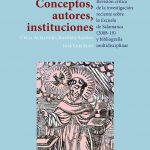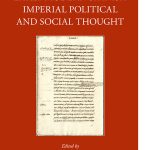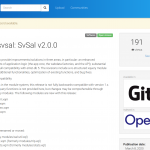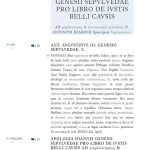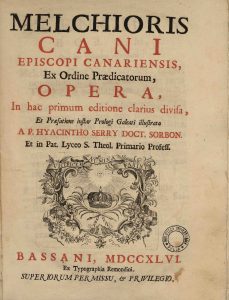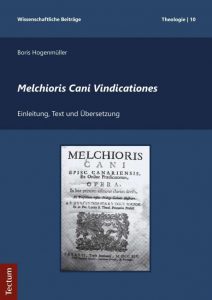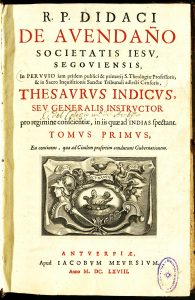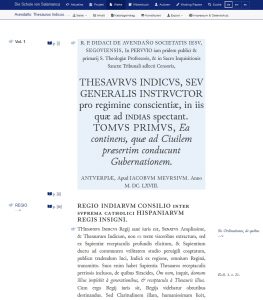Last April, Conceptos, autores, instituciones, authored by Alejandra Ramírez Santos and José Luis Egío was published by Dykinson Editors in Madrid. The book offers a panorama on the research on the School of Salamanca carried out in the last decade. In this period a great renewal of research methods took place, together with the growing interest of various disciplines in Salamanca’s scholasticism, its internationalization as a field of study and the launching of various research projects and initiatives of publication of important scholastic sources aimed at broadening previous research perspectives, until recently very focused on the study of natural law, the law of nations and some theological and metaphysical themes. Ramírez’s and Egío’s critical review of the recent research on the School of Salamanca takes its main conclusions from a wide bibliography of 2.176 academic writings having being published between 2008 and 2019. These writings are ordered according to an exhaustive list of thematic descriptors, which make it easy to locate the publications dedicated to a certain author of the School of Salamanca, concept, research topic or institution (mendicant orders, Universities, …). Continue reading “Book publication: Conceptos, autores, instituciones. Revisión crítica de la investigación reciente sobre la Escuela de Salamanca (2008-19) y bibliografía multidisciplinar”
The School of Salamanca: New Digital Editions of Nebrija’s “Lexicon Iuris Civilis” and Diego de Avendaño’s “Thesaurus Indicus”, vol. 3, now online
In March and April, two new important sources of the Digital Collection of Sources of the School of Salamanca were published:
The Lexicon Iuris Civilis, written by Nebrija in 1506, has been edited according to the printed version of Frellaeus (Lyon, 1537). Part of a big encyclopaedical project undertook by Nebrija to offer the learned community of his time systematic vocabularies of disciplines such as medicine, natural history, theology and law, Nebrija’s Lexicon Iuris Civilis integrated 600 lemmata. Continue reading “The School of Salamanca: New Digital Editions of Nebrija’s “Lexicon Iuris Civilis” and Diego de Avendaño’s “Thesaurus Indicus”, vol. 3, now online”
Before Vitoria. Birr’s and Egío’s Contribution to the Brill Companion to Early Modern Spanish Imperial Political and Social Thought
Christiane Birr and José Luis Egío’s chapter in the recently published Companion to Early Modern Spanish Imperial Political and Social Thought focusses on a number of 15th-century writings by the jurist Alfonso de Cartagena and the theologian Bernardino López de Carvajal, both of whom were very active in Castilian diplomatic circles. While Francisco de Vitoria is often seen as having played the pioneering role in identifying the new historical dilemmas entailed by the ‘discovery’ of new, pagan peoples in the Americas, the ideas underlying these issues can only be understood in their full complexity if we look back into the 15th century. Continue reading “Before Vitoria. Birr’s and Egío’s Contribution to the Brill Companion to Early Modern Spanish Imperial Political and Social Thought”
(Deutsch) Entwicklung der Webanwendung (v2.0)
Ein Bericht von David Glück und Andreas Wagner
Am 1. März 2018 wurde die Version 1.0 der Webanwendung im Rahmen eines Beitrags von Andreas Wagner und David Glück bei der Konferenz „Digital Humanities im deutschsprachigen Raum 2018“ als freie Software veröffentlicht und der wissenschaftlichen Community zur Verfügung gestellt. Seitdem wird die Webanwendung in Open Source und mit einem laufenden Versionierungsmodell weiterentwickelt. Sowohl die Webanwendung als Ganze als auch die einzelnen Releases der Anwendung sind seitdem nachhaltig archiviert und über DOIs zitierbar.1 Ebenfalls 2018 wurde die auf der Webanwendung aufbauende Digitale Quellensammlung des Projekts erstmals einem fachwissenschaftlichen Publikum präsentiert und (in Verbindung mit der Publikation von Francisco de Vitorias Confessionario, des ersten Textes der Digitalen Quellensammlung) als Forschungsplattform veröffentlicht. Im März 2020 haben wir die Version 2.0 der Webanwendung veröffentlicht. Im Folgenden wollen wir einen Überblick über die wichtigsten Entwicklungen seit der erstmaligen Veröffentlichung geben. Continue reading “(Deutsch) Entwicklung der Webanwendung (v2.0)”
The School of Salamanca: New Digital Edition of Juan Ginés de Sepúlveda’s “Apologia” now online
After Bartolomé de las Casas, his adversary in the Valladolid debate, the humanist and historian of Charles V, Juan Ginés de Sepúlveda, is now also represented in the Digital Collection of Sources: with his “Apología pro libro de iustis belli causis” (1552). Continue reading “The School of Salamanca: New Digital Edition of Juan Ginés de Sepúlveda’s “Apologia” now online”
Juan Belda Plans: Presentación de la edición crítica y la traducción al español de la Relectio de Poenitentia de Melchor Cano
Date: 5.02.2020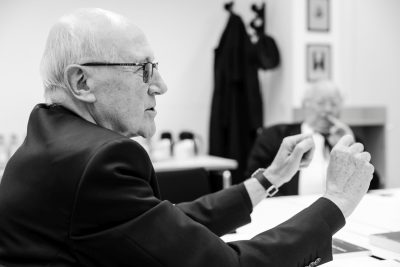
Time: 14:30 – 16:00
Speaker: Juan Belda Plans (Valencia)
Organisation: Christiane Birr, José Luis Egío
Place: MPIeR
Room: Z01
After the introduction to his editing and translation project in March 2019 [https://blog.salamanca.school/de/2019/03/11/salamanca-kolloquium-observaciones-sobre-edicion-critica-de-melchor-cano-metodos-y-subsidios-para-el-trabajo/], Juan Belda Plans will be once again a guest at the Salamanca Colloquium. This time he presents the results of his work in Frankfurt: the completed critical edition of the Relectio de Poenitentia (1549) by Melchor Cano, published in 2020, with Spanish translation.
The Colloquium will be held in Spanish.
Boris Hogenmüller: Melchor Cano, De locis theologicis – some remarks on concept and reception of the Loci
Date: 15.01.2020
Time: 14:30 – 16:00
Speaker: Boris Hogenmüller (Würzburg)
Organisation: Christiane Birr, José Luis Egío
Place: MPIeR
Room: Z01
With his extensive and complex major work De locis theologicis, Melchor Cano layed the foundations of modern dogmatics in theology. A German translation of this work was carfried out from 2006 to 20014 in the DFG project “Melchior Cano De locis theologicis. Critical Edition of the Latin Text and German Translation” by Elmar Klinger, Thomas Franz and Boris Hogenmüller. Subsequently, Hogenmüller edited and translated the Melchiori Cani Vindicationes by the French Dominican François-Jacques-Hyacinthe Serry, published in 1714, with which Serry defended Cano and the Loci against various theological-literary attacks. In the colloquium Boris Hogenmüller will talk about Cano, his work and its reception in the early modern period and thus give an insight into the highly intense theological-scientific discussions of the 16th and 17th centuries.
The Colloquium will be held in English.
Bruna Franceschini: Reflections on the Legal Subject in the Context of Latin American Colonialism
Date: 11.12.2019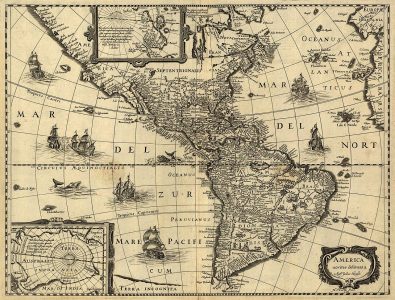
Time: 14:30 – 16:00
Speaker: Bruna Franceschini (Coimbra)
Organisation: Christiane Birr, José Luis Egío
Place: MPIeR
Room: Z01
Bruna Franceschini will talk about her doctoral research project that aims to investigate some roots of the formation of the notion of subject of Law in the context of Latin American colonialism, mainly in Brazilian context. In fact, the work is an attempt to associate the contributions of Legal History to reflections of Philosophy of Law concerning the recognition of the other for the construction of legal intersubjectivity.
The Colloquium will be held in English.
Working Discussion „Translating Melchor Cano“
Date: 11.10.2019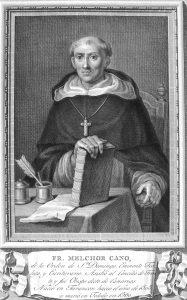
Time: 11:00 – 13:00
Speakers: Juan Belda Plans (Valencia), Elmar Klinger (Würzburg/Herzogenaurach), Boris Hogenmüller (Würzburg), Thomas Franz (Würzburg)
Organisation: Christiane Birr (MPIeR)
Location: MPIeR
Room: Z02
Melchor Cano (1509-1560) is one of the most important authors of the School of Salamanca: at the age of fifteen he entered the Dominican Order as a pupil of Francisco de Vitoria in Salamanca. At the age of twenty-five he received his first theological chair in Valladolid; after the death of his academic teacher Vitoria in 1546 he took over the renowned chair of Theology in Salamanca himself. His main work, De locis theologicis, published posthumously in Salamanca in 1563, is the fundamental work of theological knowledge of modern times and represents the first complete programme of Catholic dogmatics as an independent discipline.
A Spanish translation of this pivotal and complex work of modern theology was presented by Juan Belda Plans in 2006; Elmar Klinger, Thomas Franz and Boris Hogenmüller completed a German translation, the publication of which is still pending. The discussion will focus on the special requirements for the interpretation and translation of theological texts of the School of Salamanca, the specifics of early modern Latin and the significance of translations in the modern reception of the School of Salamanca.
Discussion languages are Spanish and German.
The School of Salamanca: New Digital Edition of Diego de Avendaño’s “Thesaurus Indicus, Vol. 1” now online
Diego de Avendaño (1594-1688) was born in Segovia. During his studies in Seville, he met Juan de Solórzano Pereira and accompanied him to the New World. Avendaño continued his studies in Lima at the Colegio San Martín of the Jesuits, joined the order himself and taught and led the Jesuitic colleges and universities in Cuzco, Charcas and Lima in the following decades. After, as he himself said, “almost fifty years in Peru” he published his main work, the six-volume Thesaurus Indicus, in which he discusses a wealth of questions of secular administration and spiritual practice. All six volumes will appear successively in the Digital Collection of Sources of the project “The School of Salamanca”. A start has now been made with the first volume devoted to the questions of the secular regiment of Peru in the 16th and early 17th centuries.
